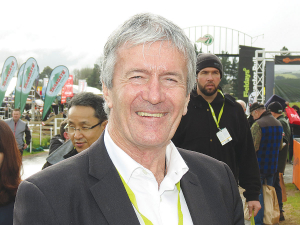Damien O’Connor: NZ united on global trade
When it comes to international trade, politicians from all sides of the aisle are united, says Labour's trade spokesman Damien O'Connor.
 Agriculture Minister Damien O’Connor has dashed any hopes of any special accommodation being made for overseas agriculture contractor workers this coming season.
Agriculture Minister Damien O’Connor has dashed any hopes of any special accommodation being made for overseas agriculture contractor workers this coming season.
Agricultural contractors are still struggling to fill the huge hole of workers it needs, despite recruiting 300 locals to the industry.
Meanwhile, the Government is refusing to allow more operators from overseas into the country. Read: Locals only will not ‘cut the mustard’.
Agriculture Minister Damien O’Connor has dashed any hopes of this happening, saying there will not be any special accommodation made for overseas agriculture contractor workers.
“The door won’t be open in time for the new season,” he concedes.
However, Rural Contractors of NZ (RCNZ) chief executive Roger Parton says agricultural contractors cannot get overseas workers visas unless our borders are open, or the Government makes some accommodation to allow them into NZ.
Parton says contractors around the country are “pulling out all the stops” to find New Zealanders who can help fill a critical shortage of skilled machinery operators.
He says, in late June, an RCNZ delegation arranged an urgent meeting with O’Connor.
“We outlined the growing concern among our members and he [O’Connor] pointed us to the closed border and encouraged us to work to do all we can to find New Zealanders.”
Parton says, since that time, RCNZ has been exhorting rural contractors to turn over every stone to find suitable New Zealand candidates.
“Our members have responded magnificently. We’ve managed to find 300 people who either have the capacity to operate complex machinery or sufficient existing skills to upgrade,” he says.
“We are now down to needing around 400 imports to work alongside the 4000 New Zealanders our members employ.”
Parton says that number includes more than 500 recruited in the last year.
“More are still being employed as they come off various training initiatives that Rural Contractors NZ has been supporting.”
In the past, RCNZ have had government approval to bring in 300 experienced machinery operators from Ireland, the UK, Europe, Canada and the US every year. Many other machinery operators come under the working holiday visa scheme.
Waikato contractor Brooke Nettleton, Bluegrass Contractors, told Rural News he needs 15 more operators from overseas this season.
He says the Government has allowed movie makers into the country but is reluctant to do the same for the agriculture sector that is keeping the country going.
“I have nothing against hiring Kiwis, but we aren’t talking about driving cars here, this is expensive machinery requiring expertise.
“There aren’t experienced operators just floating around out there.”
Parton says RCNZ is trying a number of avenues to fill the huge worker gap.
“We worked initially with SIT, at its Telford campus, which is pumping through six, 6-week induction courses for people to work for rural contractors or farmers.”
He adds that the Telford course has since been adapted at the re-opened Taratahi campus in the Wairarapa by UCOL/EIT with the first course commencing August 10. RCNZ has also been working with Waikato providers and a machinery operator to provide training.
“Most of these people may learn the skills to drive a tractor – and that’s very useful to contractors as it may free up existing staff with a capacity to step up into operating more complex machinery. However, six weeks is not generally sufficient time to develop the skills to safely operate machines which have a whole array of technology to master,” Parton explains.
RCNZ estimates rural contractors still need to find nearly 400 skilled machinery operators for the current season.
Fonterra’s impending exit from the Australian dairy industry is a major event but the story doesn’t change too much for farmers.
Expect greater collaboration between Massey University’s school of Agriculture and Environment and Ireland’s leading agriculture university, the University College of Dublin (UCD), in the future.
A partnership between Torere Macadamias Ltd and the Riddet Institute aims to unlock value from macadamia nuts while growing the next generation of Māori agribusiness researchers.
A new partnership between Dairy Women’s Network (DWN) and NZAgbiz aims to make evidence-based calf rearing practices accessible to all farm teams.
Despite some trying circumstances recently, the cherry season looks set to emerge on top of things.
Changed logos on shirts otherwise it will be business as usual when Fonterra’s consumer and related businesses are expected to change hands next month.

OPINION: Here w go: the election date is set for November 7 and the politicians are out of the gate…
OPINION: ECan data was released a few days ago showing Canterbury farmers have made “giant strides on environmental performance”.